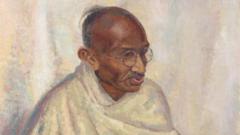India's Ministry of Culture has launched a legal challenge to block an auction showcasing a collection of jewels and sacred relics, purportedly linked to the remains of Buddha, which were excavated during British colonial rule in 1898. These relics, regarded as some of the most significant in contemporary Buddhism, are scheduled to be sold by Sotheby's on behalf of the descendants of the explorer who uncovered them.
The intricate jewels, some measuring mere millimeters, showcase exquisite patterns and have been described as invaluable pieces of spiritual heritage. The Indian government is claiming that these artifacts should be returned to their homeland for "preservation and religious veneration." The action intensifies a larger conversation surrounding the treatment of culturally significant relics taken during colonial times—a situation that puts a spotlight on property rights and ethics in the art world.
Professor Ashley Thompson of the University of London emphasized that this moment is pivotal in re-evaluating how historically significant items should be distributed and whose ownership should be recognized. As more nations engage in discussions about repatriating artifacts, several institutions, particularly in the United States and Europe, have begun to return similar items to their original cultures, marking a shift towards restitution and recognition of historical injustices.
The auction has sparked a broad dialogue on the complexities of heritage, ownership, and cultural memory, as more countries grapple with the legacies of colonialism and seek to find a path forward in honoring their ancestral links.

















